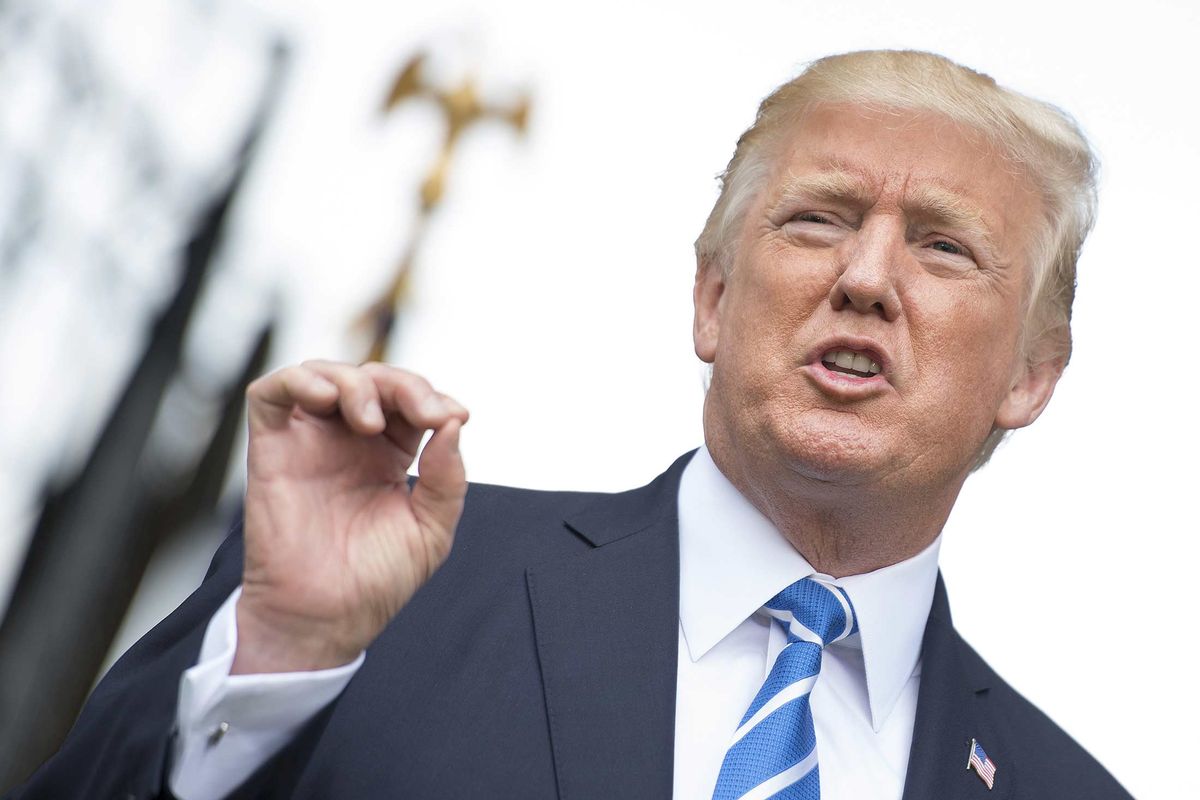Trump Warns of Potential U.S. 'Military Option' in Venezuela

EghtesadOnline: President Donald Trump said he’s considering a military option in response to the political and economic crisis in Venezuela, raising the specter of a U.S. intervention in Latin America that could spread turmoil in the region.
Trump’s statement suggested the U.S. may get more deeply involved in Venezuela, which has been subject to increasing sanctions since President Nicolas Maduro convened a national assembly designed to rewrite the country’s constitution and consolidate his power, Bloomberg reported.
“Venezuela is not very far away, and the people are suffering, and they’re dying.” Trump said during a brief news conference Friday at his golf club in Bedminster, New Jersey. “We have many options for Venezuela, including a possible military option, if necessary.”
The president declined to say whether the U.S. would seek to overthrow Maduro. He gave no specifics on what the U.S. would do militarily or whether he would act unilaterally. Vice President Mike Pence is heading to South America over the weekend, with stops including Colombia, Argentina and Chile.
U.S. military action in Venezuela risks rekindling regional resentments stemming from past interventions. It also may have the unintended effect of giving Maduro a rallying point for his supporters as he tries to suppress opposition to his policies.
For nearly two decades, U.S. presidents have served as something of a rhetorical punching bag for Venezuela’s ruling socialists. George W. Bush was dubbed “Mr. Danger,” ridiculed for what was perceived as his reckless foreign policy, and Barack Obama was constantly accused of waging an “economic war” that caused rampant food shortages and spiraling inflation.
After the late Hugo Chavez rose to power, Yankee bashing became a standard practice when government officials wanted to whip up public support at home and abroad. Leaders point to U.S. support of South American dictators, military interventions, even coups across the region and the Cuban embargo set up during the height of the Cold War.
Open Dialogue
As U.S. has increased pressure on Venezuela, the Maduro government has taken some tentative steps to open a channel of communication. Maduro wants to establish a dialog with Trump, Venezuela’s Foreign Relations ministry said on Twitter. In a subsequent post, the ministry said Maduro instructed Foreign Minister Jorge Arreaza to seek a “conversation” between the two heads of state.
Maduro had said on Thursday night that he would be willing to meet with Trump at the upcoming United Nations General Assembly meeting in New York.
“If he’s so interested in Venezuela, here I am, the head of his interest,” Maduro said on state television. “Here is my hand, here is my word.”
The White House said in a statement that Trump “will gladly speak with the leader of Venezuela as soon as democracy is restored in that country.” Maduro ignored U.S. calls to restore democracy and instead “has chosen the path of dictatorship,” it added.
Venezuela Information Minister Ernesto Villegas, writing on Twitter, called Trump’s statement the most “serious and insolent threat ever made” against the country. Villegas, speaking on state television afterward, called it “unprecedented.” Venezuela’s diplomatic corps will meet Saturday, when the Foreign Ministry will issue a statement in response to Trump, Villegas wrote on Twitter.
Hinder Diplomacy
A military move by Trump could hinder U.S. efforts to build a coordinated international response to Maduro’s undermining of democracy in his country, including among Venezuela’s neighbors.
“Frankly, it is irresponsible on his part,” Andrea Saldarriaga Jiménez, Assistant Director at the Atlantic Council’s Adrienne Arsht Latin America Center in Washington, said of Trump’s statements in a phone interview. “It undermines all of the diplomatic efforts that the countries have done this week.”
Saldarriaga Jiménez said Maduro now has “a narrative to further push for the anti-imperialism message that he has out there.”
Last week, Trump’s national security adviser, H.R. McMaster, said in an MSNBC interview that he didn’t think there would be any outside military intervention in Venezuela.
Trump delivered his warning to Venezuela on the same day he threatened to strike back militarily to provocations by North Korea.
The U.S. has imposed a series of sanctions on people associated with Maduro, freezing their assets in the U.S. and blocking anyone in the U.S. from doing business with them. The deepening political crisis and the threat of additional sanctions has worsened Venezuela’s economic turmoil. That has resulted in shortages of food and medicine.
Venezuela, a founding member of OPEC, has the world’s largest proven oil reserves and is the third-biggest source of crude for the U.S. Among the penalties still on the table is a ban on imports of Venezuelan oil, which would devastate its economy.


